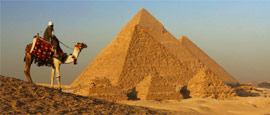Travel to Cairo
Flying to Cairo
British Airways and EgyptAir offer direct flights to Cairo from the UK. EgyptAir also operates direct flights from the USA. There is no great difference in flight prices according to the time of year. However during major Islamic holidays, prices rise and seats fill up quickly. Christmas holidays are also a busy time, for tourists and locals. Cheap flights to Cairo are more available during the summer when temperatures soar.
From London - 4 hours 40 minutes; New York - 10 hours 30 minutes; Los Angeles - 16 hours (including stopover); Toronto - 10 hours 20 minutes (including stopover); Sydney - 20 hours (including stopover).
Website:www.cairo-airport.com
Location:
Cairo International Airport is located 22km (13.5 miles) northeast of Cairo in Heliopolis.
Money:
Cairo International Airport has banks and ATMs in Terminals 1 and 3. 24-hour bureaux de change services are located in the departure areas of all terminals.
Luggage:
Baggage trolleys and porters are available. Left-luggage facilities can be found in both terminals. A lost and found service is also present in Terminal 1 (tel: +20 2 2265 5246).
Travel by road
Foreign drivers must be at least 25 years old and have an International Driving Permit. However, driving in Cairo isn’t recommended, due to mammoth traffic jams and a complete disregard of traffic laws and lane discipline. The speed limit is 90kph (56mph) on non-urban highways but most drivers will exceed this, given the opportunity.
Off the main highways, roads are mostly poor quality, with numerous bumps and potholes. Traffic drives on the right but Egyptian drivers overtake on all sides – even driving on the wrong side of the road.
In Upper Egypt vehicles must drive in convoy, defeating the purpose of hiring a car. In the Western Desert, police escorts might insist on accompanying you between the southernmost oases. Some car hire firms even insist on providing the driver.
From Alexandria - 2 hours 20 minutes; Port Said - 2 hours 30 minutes; Luxor - 7 hours 15 mintues; Aswan - 11 hours 15 minutes; Sharm - 6 hours.
Cairo is linked by regular, inexpensive coach services to other major Egyptian cities. Many are air-conditioned but there are also older, less comfortable albeit cheaper coaches.
There are several long-distance coach stations, with several different operators serving different regions of Egypt. These include the East Delta Travel Company (tel: +20 2 2405 3482; www.bus.com.eg) which offers services to Sharm el-Sheikh and Dahab and SuperJet (tel: +20 2 2266 0212) offering links to Alexandria and Hurghada. Tickets must be bought at the coach station itself, and can be booked in advance in person.
The Abdel Mouneem Riyad Terminal (also called the Ramses Hilton Terminal) offers frequent services to Alexandria, plus Hurghada, Aswan and Luxor (overnight). Nearby is the Ahmed Helmi Terminal, with several overnight coaches to Luxor and Aswan, and others to Hurghada and Middle Egypt.
Sinai Bus Terminal (officially the Abbassiyya Station, near Midan Abbassiyya) has several services daily to Sinai towns, such as Sharm el-Sheikh and Nuweiba, with one daily via St Catherine's Monastery.
Koulali Bus Terminal at Midal Ulali near Midan Ramses serves the Canal Zone and towns in the Nile Delta.
Al-Azhar Terminal, 45 Sharia al-Azhar, operates services into the Western Desert.
There are also direct buses between the airport and Alexandria.
Travel by rail
All trains stop at Cairo's main station, Ramses Station, Midan Ramses (metro: Al-Shohadaa Station) in Downtown Cairo. Trains heading south also stop at Giza Station; however it is advisable to board at Ramses because of better facilities and communications.
The rail network is limited but efficient and reasonably comfortable in first class or second class superior. The type of train varies widely. Fast trains (known as French, Spanish or Turbine) are more expensive than slower ones (Ordinary).
Egypt's railway provider is Egyptian National Railways (tel: +20 2 2574 8279; https://enr.gov.eg).
You can book tickets for first- and second-class air-conditioned trains online or make reservations for any service at the station. For short journeys e.g. from Cairo to Alexandria, try the business or travel desks at major hotels which can arrange to buy your ticket, for a small extra fee.
If travelling along the Nile Valley, foreign tourists must use the guarded trains for security reasons, the most convenient of which is the 980 fast train which departs daily from Cairo at 0800. You can reserve tickets up to seven days in advance at Ramses Station.
Watania Sleeping Train Company (tel: +20 2 3748 9388; www.wataniasleepingtrains.com) runs first-class sleeping trains, with private cabins, primarily to Luxor and Aswan from Cairo. This is the only overnight train that foreigners are permitted to travel on, and substantially more expensive than daytime trains. It is possible to book tickets online (https://e7gezly.com/sleepingtrains), at Ramses Station, hotel travel desks, or local travel agencies for a small commission. Foreign students with a valid ISIC student card qualify for a discount.
From Alexandria - 2 to 3 hours; Luxor - 7 hours; Aswan - 12 to 13 hours.
Do you have any Feedback about this page?
© 2026 Columbus Travel Media Ltd. All rights reserved. No part of this site may be reproduced without our written permission, click here for information on Columbus Content Solutions.








 You know where
You know where